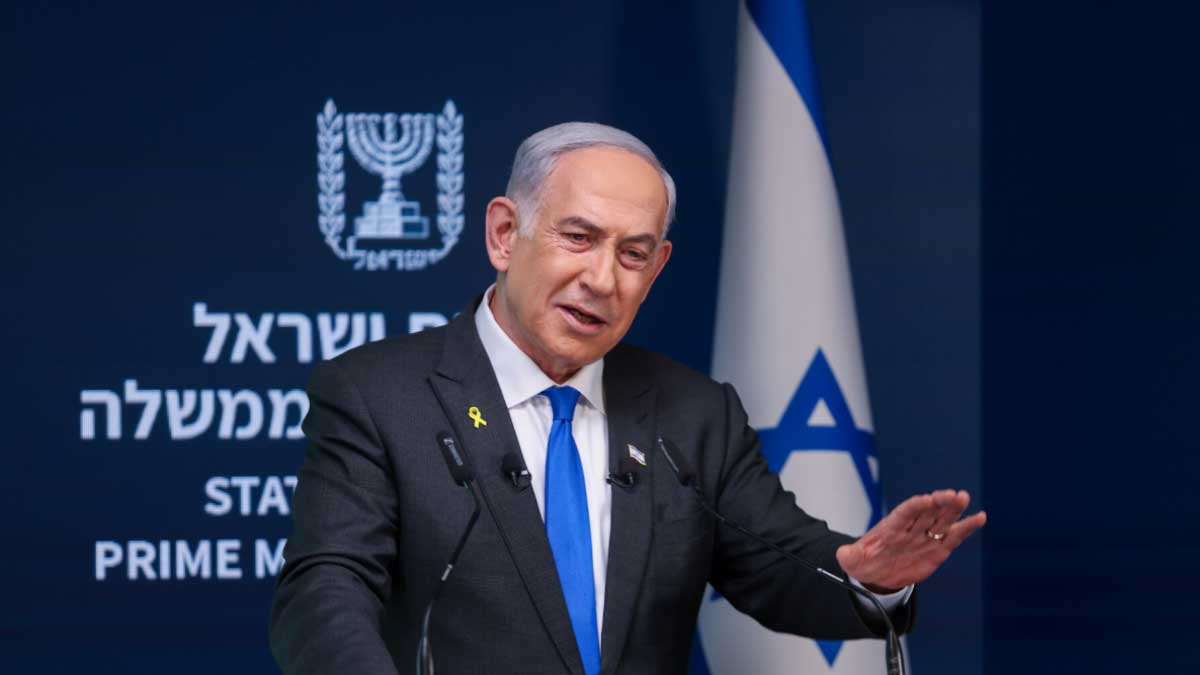- Home
- Billionaires
- Investing Newsletters
- 193CC 1000
- Article Layout 2
- Article Layout 3
- Article Layout 4
- Article Layout 5
- Article Layout 6
- Article Layout 7
- Article Layout 8
- Article Layout 9
- Article Layout 10
- Article Layout 11
- Article Layout 12
- Article Layout 13
- Article Layout 14
- Article Sidebar
- Post Format
- pages
- Archive Layouts
- Post Gallery
- Post Video Background
- Post Review
- Sponsored Post
- Leadership
- Business
- Money
- Small Business
- Innovation
- Shop
Recent Posts
Netanyahu Condemns U.K. Arms Sale Suspension

Israeli Prime Minister Benjamin Netanyahu has strongly criticized the United Kingdom’s recent decision to suspend certain arms sales to Israel, arguing that the move could potentially bolster Hamas, the militant group Israel is currently engaged with in Gaza. Netanyahu’s condemnation came after the U.K. government announced that it would halt the export of specific military equipment to Israel, a decision that U.K. officials have clarified pertains only to items that could be used for “offensive purposes” and does not compromise Israel’s overall security.
The suspension, announced by U.K. Foreign Secretary David Lammy, affects 30 out of the 350 export licenses for military equipment that the U.K. has issued to Israel. Lammy explained that the decision was the result of a review that raised concerns about the potential use of some of the equipment in ways that could violate international humanitarian law. The review suggested that certain military exports could be used in operations that might lead to serious breaches of international law, particularly in the ongoing conflict in Gaza.
Netanyahu took to Facebook to express his dismay, calling the U.K.’s decision “shameful” and asserting that it would not deter Israel from its mission to defeat Hamas. He argued that the suspension was a misguided action that could encourage Hamas by signaling a lack of full international support for Israel’s military efforts. Netanyahu emphasized that Israel is committed to adhering to international law and is making significant efforts to protect civilians during its operations.
The Israeli leader also pointed out that British citizens were among the victims of the October 7 attack by Hamas on Israel, an incident that claimed the lives of 1,200 people, including 14 British nationals. He also noted that five British citizens are currently being held hostage in Gaza by Hamas, underscoring the stakes involved in the conflict.
Former British Prime Minister Boris Johnson also weighed in on the issue, accusing the current government of abandoning Israel. Johnson questioned whether the U.K. government, led by the Labour Party, intended to support Hamas by undermining Israel’s military capabilities. His remarks reflect a broader debate within the U.K. about the country’s stance on the Israel-Hamas conflict, with some factions advocating for stronger support for Israel and others pushing for a more balanced approach that includes considerations for Palestinian rights and humanitarian concerns.
In response to the criticism, U.K. Defence Secretary John Healey appeared on the BBC’s morning television and radio programs to defend the government’s decision. Healey reiterated that the suspension applies only to military equipment that could be used in offensive operations in Gaza and poses a risk of violating international law. He emphasized that the U.K. remains a steadfast ally of Israel and that the suspension of these specific arms exports would not significantly impact Israel’s security. Healey’s comments were aimed at reassuring both domestic and international audiences that the U.K. is not withdrawing its support for Israel, but is instead ensuring that its military assistance complies with legal and ethical standards.
Despite the controversy, the U.K.’s suspension of certain arms sales is unlikely to have a substantial effect on Israel’s military operations. According to the BBC, arms from the U.K. account for only about 1% of Israel’s total military imports, with the majority of Israel’s military equipment coming from the United States. A report by the Stockholm International Peace Research Institute published in March highlighted that the U.S. provided 69% of Israel’s military imports between 2019 and 2023, underscoring the limited role of British arms in Israel’s overall military capacity.
The U.K.’s decision comes at a time when international pressure for a ceasefire in Gaza is mounting. In the United States, pro-Palestinian activist groups have called on President Joe Biden’s administration to halt military aid to Israel. However, while President Biden has expressed criticism of Netanyahu’s policies, he has not taken steps to suspend arms shipments to Israel. Vice President Kamala Harris, in a recent interview with CNN, echoed calls for a ceasefire but maintained that the U.S. would not impose conditions on its military assistance to Israel. Harris also emphasized that any resolution to the conflict must include provisions for the security, self-determination, and dignity of the Palestinian people.
The U.K.’s arms suspension is part of a broader global debate on the ethical implications of military aid and the responsibilities of arms-exporting nations. As the conflict in Gaza continues, the international community remains divided over how to balance support for Israel’s right to self-defense with the need to prevent further humanitarian crises in the region. The U.K.’s decision, while symbolically significant, highlights the complex dynamics at play as countries navigate their roles in the ongoing conflict.
Recent Posts
Categories
- 193cc Digital Assets2
- 5G1
- Aerospace & Defense46
- AI37
- Arts3
- Banking & Insurance11
- Big Data3
- Billionaires449
- Boats & Planes1
- Business328
- Careers13
- Cars & Bikes76
- CEO Network1
- CFO Network17
- CHRO Network1
- CIO Network1
- Cloud10
- CMO Network18
- Commercial Real Estate7
- Consultant1
- Consumer Tech180
- CxO1
- Cybersecurity68
- Dining1
- Diversity, Equity & Inclusion4
- Education7
- Energy8
- Enterprise Tech29
- Events11
- Fintech1
- Food & Drink2
- Franchises1
- Freelance1
- Future Of Work2
- Games141
- GIG1
- Healthcare78
- Hollywood & Entertainment186
- Houses1
- Innovation42
- Investing2
- Investing Newsletters4
- Leadership65
- Lifestyle11
- Manufacturing1
- Markets20
- Media193
- Mobile phone1
- Money13
- Personal Finance2
- Policy567
- Real Estate1
- Research6
- Retail1
- Retirement1
- Small Business1
- SportsMoney33
- Style & Beauty1
- Success Income1
- Taxes2
- Travel10
- Uncategorized8
- Vices1
- Watches & Jewelry2
- world's billionaires418
Related Articles
Trump Moves $4B Stake in Truth Social Parent, Stock Drops 6%
Donald Trump recently transferred his 57% stake in Trump Media & Technology...
By 193cc Agency CouncilDecember 20, 2024House Rejects Trump-Backed Funding Bill, Shutdown Looms
The U.S. House of Representatives rejected a new government funding bill on...
By 193cc Agency CouncilDecember 20, 2024Trump Named Time’s Person of the Year for Second Time
On Thursday, Time magazine honored Donald Trump as its “Person of the...
By 193cc Agency CouncilDecember 12, 2024Meta Donates $1 Million to Trump’s Inaugural Fund
Meta, the parent company of Facebook and Instagram, has confirmed a $1...
By 193cc Agency CouncilDecember 12, 2024















Leave a comment